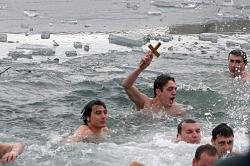|
| Male and female Voditsi – Yordanovden and Ivanovden |
|
|
 On January 6 the Christian world marks an ancient feast day - Epiphany – the day when John the Baptist or the Precursor baptized Jesus Christ in the waters of the Jordan River.
On January 6 the Christian world marks an ancient feast day - Epiphany – the day when John the Baptist or the Precursor baptized Jesus Christ in the waters of the Jordan River.
In Bulgarian tradition this day is known as Yordanovden, Voditsi, Vodokrust, Vodokrushti. It is a day people look forward to as it marks the end of one of the most arduous periods of the year – the so-called “unclean” or “dirty” days stretching from Christmas until Epiphany. In many towns and villages across the country rituals for health - of humans and cattle alike - are performed on the previous day. At the beginning of the 20th century, renowned Bulgarian ethnographer Dimitar Marinov described the maiden ritual called sivuinitsa or sovoinitsa, performed on 5 January. The lasses would gather in the morning and select a “bride” and a “lad”. The “bride” would put on a veil made out of a red sash, the “lad” would be dressed up in men’s clothing. The girls singled out to perform the ritual songs would start out with the “couple” selected. The younger girls would carry bags or baskets to put the gifts from their hosts in. One of the lasses would carry a caldron of water and a nosegay of basil. Drawn in the dead of night, this water had the power to ward off evil and was used to sprinkle people, animals and houses.
The dishes laid out on the table on the eve of Epiphany had to be meatless. They would include millet bread or dodgers, cabbage leaves stuffed with grits, boiled wheat, bean stew, walnuts and wine. This is the last thurified dinner in the string of Christmas and New Year feasts. According to traditional belief on the night before Epiphany the skies open up and anyone who has seen this shall have everything he or she desires. Bulgarian folklore abounds in comical tales that tell the stories of what humans wish for at this magical moment. For example: once upon a time there was a man who lived to see the sky opening up. His wish was to have a bushelful of gold. But he got so muddled up when the time came that he said: “Oh Lord, give me a bushel-head!” So, God fulfilled his wish and the poor man got a head as big as a bushel.
According to Bulgarian tradition on Yordanovden the local priest throws a cross into a river, a pool or a lake. Men gather to wait for this moment and then dive into the icy waters to retrieve it. The cross then has to be given back to the priest who blesses the man who has braved the ordeal, as well as all people present at the ritual. It is said that he who has fished the cross out of the waters shall be healthy and happy throughout the year. On this day people take home holy water from the church; the holy water kept from the previous Yordanovden is used to knead three ritual loaves of bread. One is set aside for the home, the second – for guests and the third is left at the front door for passers by. According to another ritual men who have married or become engaged that same winter, as well as baby boys are also bathed outdoors, hence the name Male Voditsi (waters). Yordanovden is the day when all people called Yordan, Yordanka, Bozhidar, Bozhan, Dana etc., celebrate their name-day.
January 7 is Ivanovden – the day of St. John the Baptist. In popular tradition it is the day celebrated by all people named Ivan, Ivanka and their derivates. The office of best man, fraternization and in a broader sense – friendship is part of the tradition of this day. That is why feasts were once organized in every home. Recently weds would visit their in-laws and again there was ritual bathing, but this time the women – brides and fiancées – would join in. Hence, Ivanovden also goes by the name of Female Voditsi. Once groups of young men would scour villages for people called Ivan and bathe them. They were allowed to bathe even wealthy people – during the time of Ottoman domination the beys and pashas. The “bathers” would go unpunished if they bathed someone against their will – the official authorities would take no complaints. Yordanovden and Ivanovden mark the beginning of the period when match-makers would be sent out; weddings were allowed right up to the beginning of Lent. |
|
|
Source:
bnr.bg
|
| Thursday, Jan 03, 2019 |
|
|
|
|
| » RENTALS |

|
|
|
| Commercial |
€ 1 280 |
|
| Location: |
Veliko Tarnovo |
|
|

|